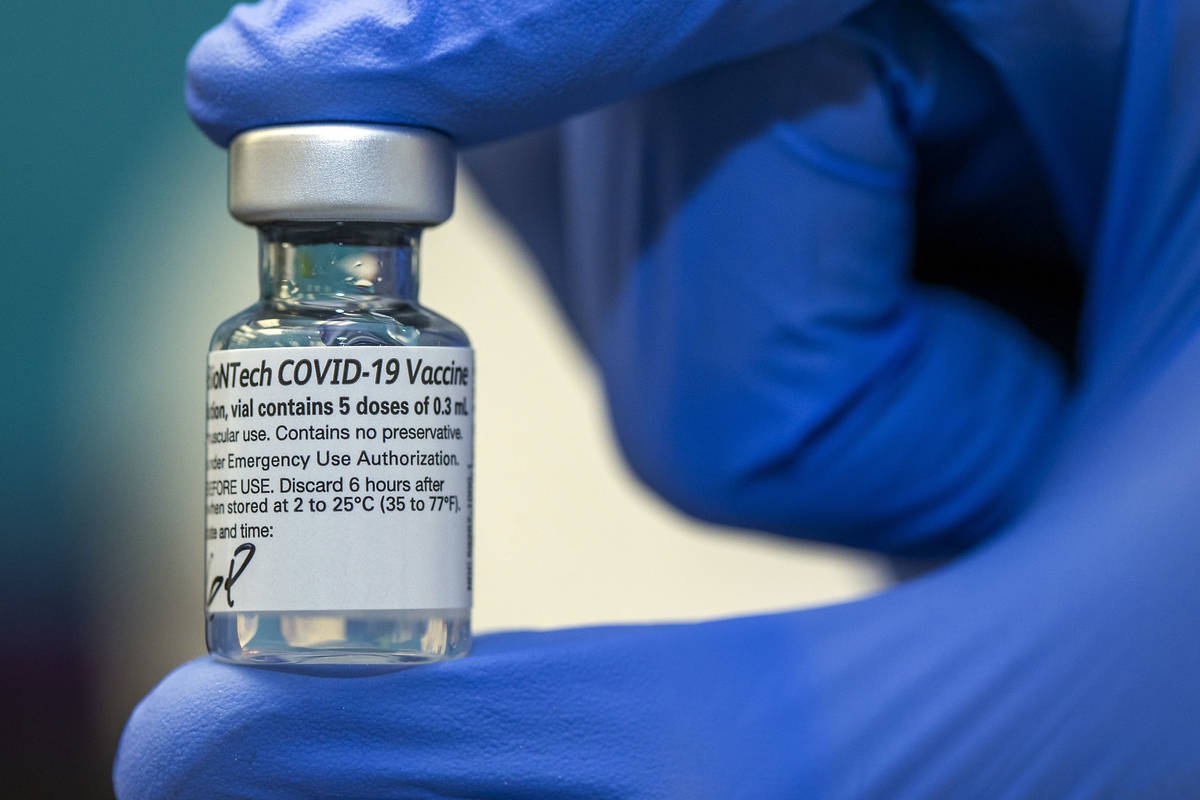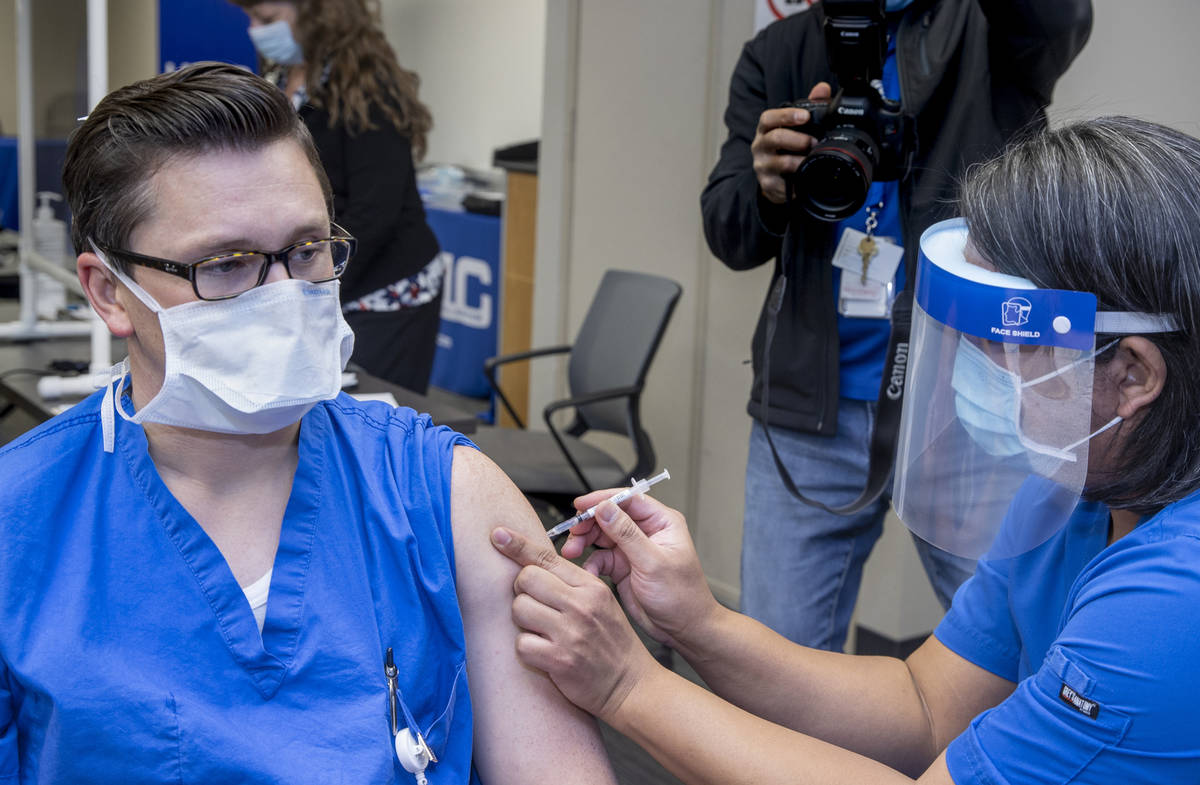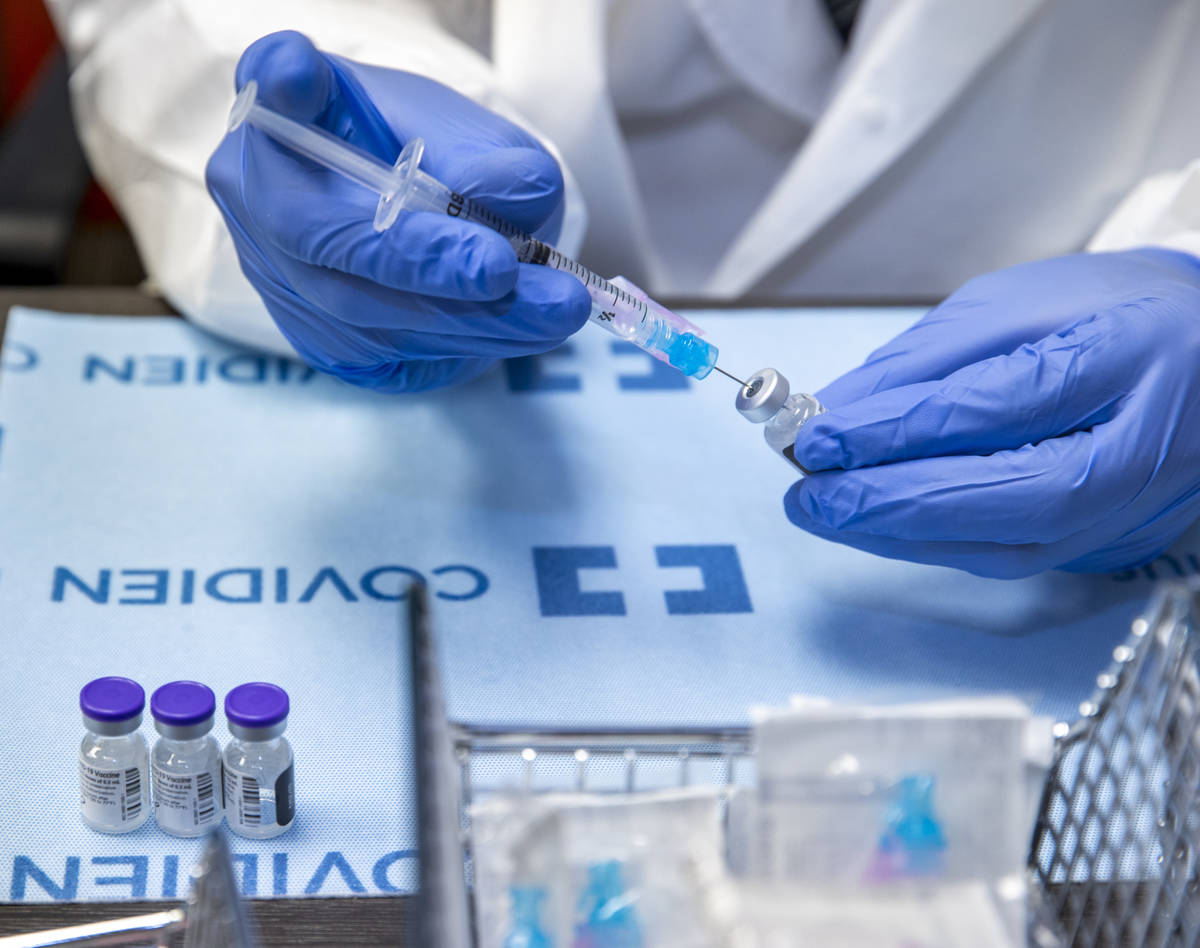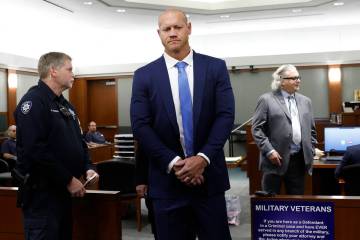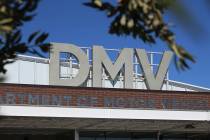Q&A: Who should get the COVID-19 vaccine? Who shouldn’t?
The past week was historic, as the first vaccine designed to prevent COVID-19 was given to health care workers as part of the largest vaccination effort in U.S. history.
As Nevadans begin to line up for a shot, we answer some frequently asked questions about the vaccine:
Who should get the vaccine?
The Centers for Disease Control and Prevention has recommended for people 16 and older a vaccine developed by U.S. drug company Pfizer Inc. and German-based BioNTech. The recommendation followed a Food and Drug Administration decision to authorize the vaccine for emergency use. This vaccine started to be administered across the country in the past week.
The FDA on Friday authorized a similar vaccine for emergency use for people 18 and older, this one developed by Moderna Inc. with the National Institutes of Health. Once the CDC in turn issues its recommendation, expected as soon as this weekend, this vaccine also can be distributed.
Clinical trials in tens of thousands of people have found both vaccines to be generally safe and highly effective across all populations and age groups studied. The Pfizer vaccine was found to be 95 percent effective in studies and the Moderna vaccine 94.1 percent effective.
Each vaccine requires two doses three to four weeks apart to be fully effective. Each shot of the double dose needs to be of the same vaccine.
Can younger children be vaccinated?
Not at this time. There needs to be more study of the vaccine’s effects on children, who generally experience milder effects from the virus.
What are the side effects?
Side effects seen in clinical trials have included those similar to other types of vaccines, including redness and soreness at the injection site, fever, body aches and fatigue.
“When you get this shot, and you get a sore arm, maybe you get a fever — maybe it’s high. That means this vaccine is doing what it’s supposed to do and make you immune to illness,” Dr. Trudy Larson with UNR’s School of Community Health Sciences said in a public service announcement from the nonprofit Immunize Nevada.
People may feel ill for a day or two after getting the vaccine, especially after the second shot, which is required three to four weeks after the first one.
Have there been serious reactions?
With the Pfizer vaccine, there have been two instances of anaphylaxis, which is a severe allergic reaction, in Britain and one in Alaska. Each individual recovered.
The CDC recommends that people with a history of anaphylaxis from any cause be observed for 30 minutes after receiving the vaccine. Everyone else should be observed for 15 minutes.
British regulators have recommended against vaccination for people who have experienced anaphylaxis from allergies to food or medicine.
Studies of both vaccines reported a small number of cases of a temporary facial paralysis called Bell’s palsy. Moderna found three cases in the vaccine group and one in the placebo group, and Pfizer had four cases, all in the vaccine group. But the FDA did not think the disorder was related to the vaccine.
Should pregnant women get the vaccine?
Pregnant women were not included in clinical trials evaluating the safety and effectiveness of vaccines. The American College of Obstetricians and Gynecologists said that the vaccine “should not be withheld from pregnant women” but stopped short of recommending vaccination.
In its guidance, the organization said that pregnant women may want to speak with their doctor about getting inoculated but that such a conversation should not be required “as this may cause unnecessary barriers to access.”
What about those who have already had the coronavirus?
The CDC is awaiting more data before giving advice on this.
“Due to the severe health risks associated with COVID-19 and the fact that re-infection with COVID-19 is possible, people may be advised to get a COVID-19 vaccine even if they have been sick with COVID-19 before,” the agency said.
It’s unknown for how long a person is protected from the virus after having an infection. It also is unknown how long protection from a vaccine lasts.
University Medical Center has provided this guidance to its staff: “Although infection with COVID-19 does provide some degree of natural immunity, this may not last very long. Those who have previously recovered from COVID-19 should receive the vaccine.”
As for individuals with active cases of the coronavirus, the vaccine is not designed to treat the virus, only to prevent it.
Can a person get the virus from the vaccine?
No, the CDC says. “None of the COVID-19 vaccines currently in development in the United States use the live virus that causes COVID-19.”
It’s possible that a person could be infected with the virus that causes COVID-19 just before or after vaccination and still get sick. It typically takes a few weeks to build immunity after vaccination.
How do the vaccines work?
Both the Pfizer and Moderna vaccines are messenger RNA (mRNA) vaccines, a new technology that uses genetic code to instruct the body to create a harmless piece of the “spike” protein. That causes the body to launch an immune response that would attack the coronavirus in an infection.
The COVID-19 vaccines are the first to be based on the gene-based technology, though mRNA vaccines have been studied and worked on for more than a decade.
“mRNA from the vaccine never enters the nucleus of the cell and does not affect or interact with a person’s DNA,” the CDC says.
When can I get the vaccine?
It depends on your job and your risk for severe illness.
According to a tiered systems in Nevada, vaccine is being made available first to frontline health care workers at acute-care hospitals who are at high risk for contracting the virus.
In the coming week, vaccinations of both residents and staff will start at long-term health care facilities such as nursing homes. CVS and Walgreens pharmacy personnel will be administering the shots.
Other health care workers also are near the front of the line, with those who are part of the community’s critical infrastructure and at heightened risk of exposure, such as law enforcement and public safety personnel.
Starting in January, the state expects to have enough vaccine to begin inoculating a second tier. That includes teachers and child care staff, higher education faculty members, essential public transportation workers, essential retail workers and prison inmates.
Vaccinations for this tier are expected to continue into February, according to the current version of the state’s vaccine playbook, which is subject to change based on federal recommendations as well as changing local needs.
A third tier includes those with underlying health conditions as well as people 65 and older.
The final tier is younger, healthier individuals.
Exactly when vaccine will be available to each tier depends on supplies. Most health authorities expect a vaccine to be available to the public by spring or early summer.
“My hope is that Nevada does get a significant amount of supply over the next few months and that we can move through those tiers quicker,” said Heidi Parker, executive director of nonprofit Immunize Nevada.
Where can I get a shot?
At first, most vaccine will be available through workplaces such as hospitals and long-term care facilities.
As vaccine becomes more widely available, the Southern Nevada Health District plans to have mass vaccination events, similar to current public testing operations in Clark County.
Vaccine will also become available at pharmacies and other locations.
When will things return to normal?
Once enough people have immunity, either from getting vaccinated or from having been infected, disease transmission will slow to the point where even people without immunity are unlikely to become ill. This community protection is often referred to as “herd immunity,” and public health officials view it as the key to a return to normalcy.
The CDC says that it is not known what percentage of the population will need to be vaccinated to achieve herd immunity, but some estimates put the figure at 65 to 70 percent.
If you have a question or concern about COVID-19 vaccines, email us at vaccinequestions@reviewjournal.com. Answers to selected questions will be featured on Sundays in addition to the weekly data update.
Raising public awareness
Immunize Nevada has launched a public awareness campaign to accompany the rollout of COVID-19 vaccines, including ads and public service announcements.
As part of the $600,000 campaign funded by the federal CARES Act, the nonprofit has created public service announcements addressing a range of topics, including vaccine safety and side effects.
The public service announcements with other information can be found at nvcovidfighter.org.



